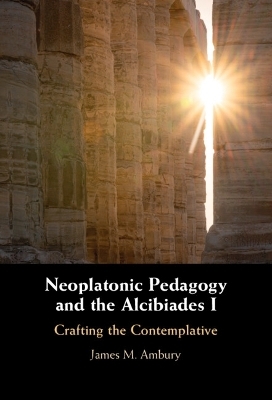
Neoplatonic Pedagogy and the Alcibiades I
Crafting the Contemplative
Seiten
2024
Cambridge University Press (Verlag)
978-1-009-10021-2 (ISBN)
Cambridge University Press (Verlag)
978-1-009-10021-2 (ISBN)
Bringing together both works to reveal a common vision of philosophy as it was understood in the lecture halls of late antiquity, this monograph is the only book-length study exclusively devoted to the reception of the Platonic dialogue Alcibiades I in the commentaries of Proclus (412–485 AD) and Olympiodorus (495–60 AD).
Many philosophers in the ancient world shared a unitary vision of philosophy – meaning 'love of wisdom' – not just as a theoretical discipline, but as a way of life. Specifically, for the late Neoplatonic thinkers, philosophy began with self-knowledge, which led to a person's inner conversion or transformation into a lover, a human being erotically striving toward the totality of the real. This metamorphosis amounted to a complete existential conversion. It was initiated by learned guides who cultivated higher and higher levels of virtue in their students, leading, in the end, to their vision of the Good, or the One. In this book, James M. Ambury closely analyses two central texts in this tradition: the commentaries by Proclus (412–485 AD) and Olympiodorus (495–560 AD) on the Platonic Alcibiades I. Ambury's powerful study illuminates the way philosophy was conceived during a crucial period of its history, in the lecture halls of late antiquity.
Many philosophers in the ancient world shared a unitary vision of philosophy – meaning 'love of wisdom' – not just as a theoretical discipline, but as a way of life. Specifically, for the late Neoplatonic thinkers, philosophy began with self-knowledge, which led to a person's inner conversion or transformation into a lover, a human being erotically striving toward the totality of the real. This metamorphosis amounted to a complete existential conversion. It was initiated by learned guides who cultivated higher and higher levels of virtue in their students, leading, in the end, to their vision of the Good, or the One. In this book, James M. Ambury closely analyses two central texts in this tradition: the commentaries by Proclus (412–485 AD) and Olympiodorus (495–560 AD) on the Platonic Alcibiades I. Ambury's powerful study illuminates the way philosophy was conceived during a crucial period of its history, in the lecture halls of late antiquity.
James M. Ambury is Associate Professor of Philosophy at King's College, Pennsylvania. He is the author of numerous articles on the Platonic tradition, and the co-editor (with Andy German) of Knowledge and Ignorance of Self in Platonic Philosophy (Cambridge 2019).
Introduction: Curriculum and Contemplative; 1. The Self-Knowledge Necessity: Opening Remarks; 2. Exalting Eros: Proem (103a1–106c2); 3. How Should I Live?: The Elenctic Section (106c3–119a7); 4. What Do I Want?: The Protreptic Section (119a8–124a8); 5. Who Am I?: The Maieutic Section (124a8–135e8).
| Erscheinungsdatum | 14.05.2024 |
|---|---|
| Zusatzinfo | Worked examples or Exercises |
| Verlagsort | Cambridge |
| Sprache | englisch |
| Themenwelt | Literatur ► Klassiker / Moderne Klassiker |
| Geisteswissenschaften ► Philosophie ► Metaphysik / Ontologie | |
| Geisteswissenschaften ► Philosophie ► Philosophie Altertum / Antike | |
| ISBN-10 | 1-009-10021-1 / 1009100211 |
| ISBN-13 | 978-1-009-10021-2 / 9781009100212 |
| Zustand | Neuware |
| Informationen gemäß Produktsicherheitsverordnung (GPSR) | |
| Haben Sie eine Frage zum Produkt? |
Mehr entdecken
aus dem Bereich
aus dem Bereich
eine philosophische Reise
Buch | Softcover (2024)
Goldmann (Verlag)
14,00 €


